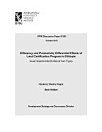Reverse-Share-Tenancy and Marshallian Inefficiency: Landowners Bargaining Power and Sharecroppers Productivity
Hosaena Ghebru Hagos · Stein T. Holden
maj 2013 · IFPRI Discussion Paper Bok 1 · Intl Food Policy Res Inst
E-bok
48
Sidor
family_home
Kvalificerad
info
reportBetyg och recensioner verifieras inte Läs mer
Om den här e-boken
While there are ample empirical studies that claim the potential disincentive effects of sharecropping arrangements, the existing literature is shallow in explaining why share tenancy contracts are prevalent and diffusing in many developing countries. Using a unique tenant-landlord matched dataset from the Tigray region of Ethiopia, we are able to show how the tenants strategic response to the varying economic and tenure-security status of the landlords can explain sharecroppers productivity differentials. To the best of our knowledge, this is the first study to use tenantlandlord matched data that accounts for both the supply (landlord) and demand (tenant) side characteristics in analyzing sharecroppers level of effort and productivity. The study reveals that sharecroppers yields are significantly lower on plots leased from landlords who are non-kin, who are female, who have lower income-generating opportunity, and who are tenure insecure than on plots leased from landlords with the opposite characteristics. While, on aggregate, the results show no significant efficiency loss on kin-operated sharecropped plots, more decomposed analyses indicate strong evidence of Marshallian inefficiency on kin-operated plots leased from landlords with weaker bargaining power and higher tenure insecurity. This study thus shows how failure to control for the heterogeneity of landowners characteristics can explain the lack of clarity in the existing empirical literature on the extent of moral hazard problems in sharecropping contracts.
Betygsätt e-boken
Berätta vad du tycker.
Läsinformation
Smartphones och surfplattor
Installera appen Google Play Böcker för Android och iPad/iPhone. Appen synkroniseras automatiskt med ditt konto så att du kan läsa online eller offline var du än befinner dig.
Laptops och stationära datorer
Du kan lyssna på ljudböcker som du har köpt på Google Play via webbläsaren på datorn.
Läsplattor och andra enheter
Om du vill läsa boken på enheter med e-bläck, till exempel Kobo-läsplattor, måste du ladda ned en fil och överföra den till enheten. Följ anvisningarna i hjälpcentret om du vill överföra filerna till en kompatibel läsplatta.








